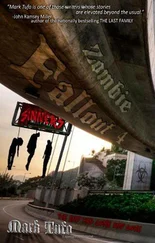In the anonymous cubicle where he ended up, the carpet was gray and the ceiling was white. The fabric walls were orange, and there was a desk with no chair. One edge of the desk was chipped, or whittled — it almost looked gnawed — revealing the cheap permaboard inside. Otherwise there was nothing else to it — and nothing to do but figure out how cancer was funny. The room hummed with a canny stillness, which should have aided his concentration, but instead distracted him. Maybe it was the sound of the overhead lights. It was as if the blank page had followed him and morphed through a miracle of physics into a pure sound. All fifty-nine was a blank page, separated by cubicle partitions. The floor’s lonesome eeriness surrounded him in its silence and blankness like an all-consuming void, and once he was sucked in, he would lose not only his job, but his mind as well. To distance himself from these bleak thoughts, he started to ruminate on more pleasant matters, like what he would have for lunch. He was pleased to find a Styrofoam coffee cup on the floor under the desk, a cigarette butt curled at the bottom like a dead tequila worm. Proof of life! Nothing funny coming to him, he shook the coffee cup and watched the butt bounce around until that activity brought out stale and unpleasant fumes, which reminded him of Old Brizz. Could it have been, he wondered, Brizz’s own snuffed cigarette? Had one winter day been simply too much for him, so that he snuck down to fifty-nine, where he enjoyed three or four illicit puffs in the climate-controlled comfort of the indoors? Jim thought how grand it would be if the butt was Brizz’s — a memento mori from a moment’s stolen pleasure, perhaps all that was necessary to validate an entire lifetime. But the find also got him thinking again: Brizz had died of cancer. How could anything be funny about dying a miserable death and leaving nothing behind but a cigarette butt? Not proof of life — proof of death. Jim was further afield than ever. Suddenly the silence on fifty-nine felt less like the blank page and more like the silence of catacombs. Each of the empty cubicles was a chamber waiting for its coffin.
A tinkling sound distracted him. What a great relief. He pricked up his ears. Silence. Enduring silence. Then — clink clink — clink. Clink. “Urfff,” someone said. Thank god — proof of life. He got up and entered the hallway. He looked in both directions, waiting. More silence. Then the dull sound of something heavy hitting carpet — thump. It seemed to come from further down — that honeycomb of cubicles over there, nearest the windows. Then, the cacophony of many tools being stirred about. That led him the rest of the way. He came to the doorway of a cubicle where he found Chris Yop on his knees taking a wrench to an upended chair.
When Yop looked up and saw Jim standing in the cubicle doorway, he said nothing. He simply went back to work. “Yop,” said Jim, “what’s that you’re doing down there?” Yop didn’t reply. The base of the chair consisted of six spokes, each of which ordinarily had a wheel attached to its end. The spokes were facing in Jim’s direction, and looked like the dangling legs of an upturned bug. Yop was kneeling at one side of the chair and removing the sixth and final wheel. Done with that, he placed the wheel in with the others. He had with him a large black suitcase — the kind one rolls through airports — which lay next to Reiser’s toolbox in the crowded little workstation. Everyone knew Reiser kept tools in his office, and Yop had evidently borrowed them. He had tucked his tie between the two middle buttons of his dress shirt, so it wouldn’t hang down and interfere. Jim said he looked like a copy-machine technician, but a confused one, operating on a chair. “Whose chair is that, Chris?” Jim asked. Again Yop didn’t reply.
We got this story from Marcia Dwyer, who heard it from Benny. When Jim first related it to Benny, inside Benny’s office, Benny asked him, “Weren’t you worried about being seen with him, doing what he was doing?” Predictably, Jim said he hadn’t even thought about it. “From the minute I saw him, I knew what he was up to,” he said to Benny, “but I didn’t think I’d get in trouble for it. Besides, it was something to watch. You ever seen a chair get taken apart like that?” At one point, after several minutes of continuous work, Yop stood and took his suit coat off, folding it neatly over a cube wall. Then he unbuttoned his cuffs and rolled up his sleeves and wiped his brow with the backs of his hairy wrists. “How come you’re so dressed up, Chris?” Jim asked him. Again, no reply. Not so much as a glance in Jim’s direction. Strange behavior coming from Chris Yop, who yammered on and on about whatever the fuck. It made standing there awkward for Jim. It occurred to him for the first time that the silence might be deliberate, that Yop was upset with him for some reason.
“What would he have to be upset with you for?” asked Benny. “You didn’t do anything to him.” “I didn’t think I had,” Jim said. “But I was standing in the doorway talking to the guy and he wasn’t answering. So I started wondering if I had pissed him off somehow.” Later, when Marcia related the story to us after hearing it from Benny, we thought that that was exactly how insecure Jim Jackers would react. There was Chris Yop, no longer an employee, told to leave the building two days ago under threat of arrest and currently destroying agency property, and still Jim wanted to be his friend.
He asked Yop if he had done something wrong. Yop didn’t even bother to look up from the chair. “You didn’t e-mail me about the changes to the project,” he finally replied. According to Jim, this was said as if Yop were Jim’s boss, and that serious consequences would follow from Jim’s oversight. At the same time, Yop sounded hurt. Jim had to remind himself that he hadn’t done anything wrong and had no reason to feel guilty. “Was I supposed to e-mail you?” he asked. “I asked somebody to,” said Yop. “Do you not remember me asking?” “You mean yesterday at the coffee bar?” “Nobody e-mailed me,” said Yop, who was now working a set of bolts connected to the base of the chair. “Which is okay,” he added. “I am not unaware, Jim, that I have been shitcanned. Everyone thinks I’m unaware of that — I am not unaware. I am not unaware that I’m an old man and that this is a young man’s game.” Jim told him he didn’t think forty-eight was so old, and that he’d probably have a new job in no time. Then he tried to explain to Yop that the change to the project was so bewildering — he was really struggling to arrive at even a single concept — that he wouldn’t have felt confident e-mailing anyone about it. “Hey, Jim,” said Yop, looking at Jim for the first time since he appeared in the doorway, and what Jim saw was the flushed, perspiring, dejected expression of someone trying to conceal the anger that made his voice quiver. “You don’t have to explain to me, okay? It would have been stupid of you to e-mail me. Any of you. You don’t think I know that? Hey,” he added, his hands shaking as he opened his arms wide, “I’m not stupid. I know I’ve been shitcanned. I know no one wants to be caught exchanging e-mails with me. I just didn’t expect to be treated the way I was treated yesterday at the coffee bar.”
Upon hearing that, Benny demanded to know, “How did we treat him yesterday at the coffee bar?” Jim said he couldn’t remember. When he related the story to Marcia, Benny asked her, “Do you remember treating him any particular way yesterday at the coffee bar?” Marcia stood in Benny’s doorway next to the skeleton, hands on her hips, wrists turned inward. “I think I called him insane,” she said.
Читать дальше












